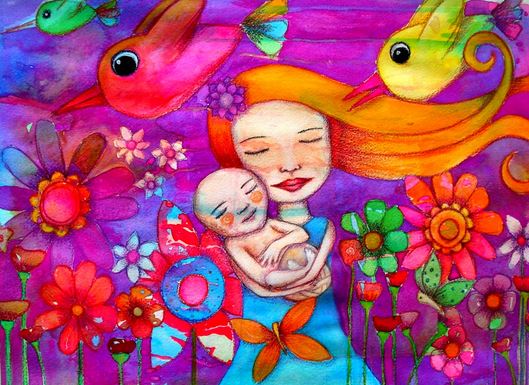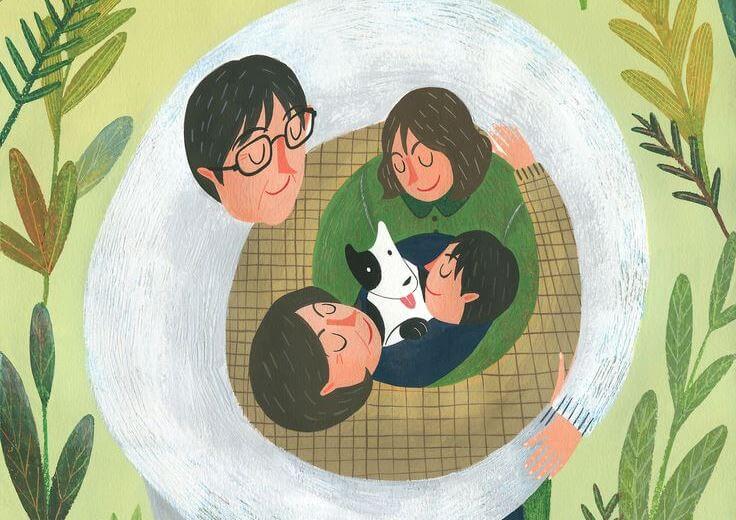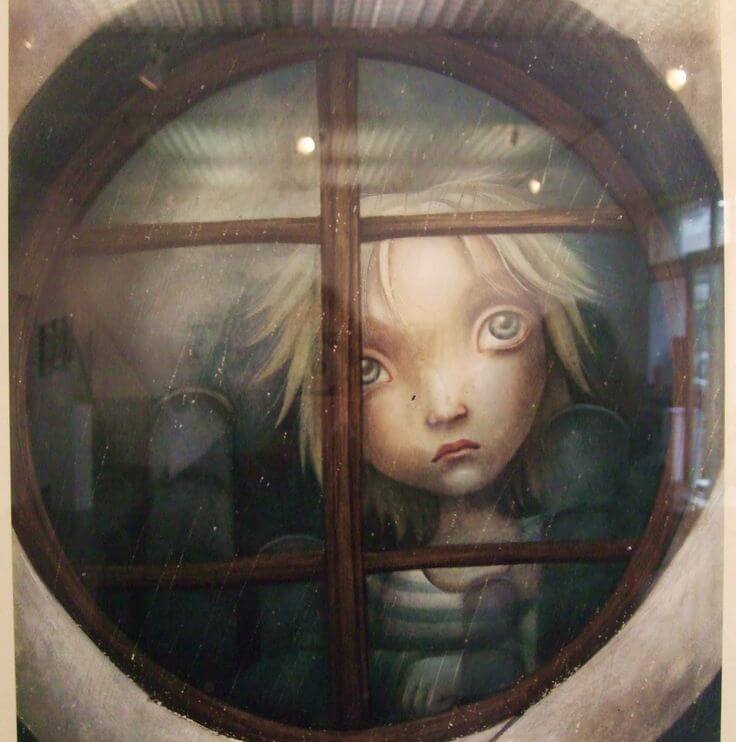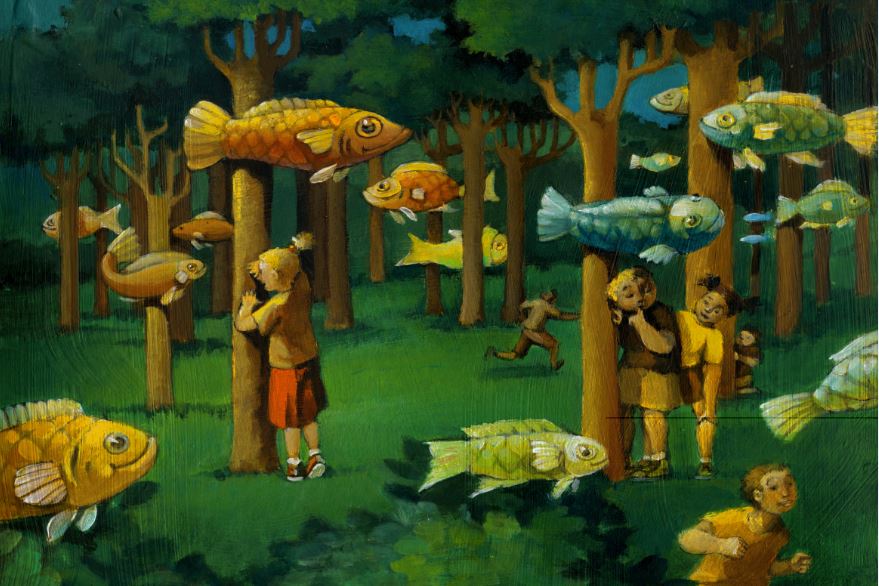Children with Special Needs Don't Need Pity

Children with special needs don’t need pity. They need other attitudes that surely anyone can give them: naturalness, love and comprehension. Nobody likes for other people to look at them with pity in their eyes.
A compassionate look can be given with the best intentions in the world, but in reality it can stigmatize and devalue the person you’re looking at. When someone looks at you with compassion due to a physical defect, a tough economical situation or a mistake you’ve made, it makes you feel even worse. It makes you think about all of the things you did wrong to cause this pity.
The special child and his family go through endless stressful situations that can be made better if they sense good social support around them. We’re going to describe some of the situations that these families and children go through to help you develop an empathetic and adequate attitude towards them.
“A disability doesn’t define you. What defines you is how you face the challenges that this disability poses.”
-Jim Abbott-
A difficult diagnosis
Every pregnancy is its own world, but all mothers and fathers wish for it to go as smoothly as possible. They wish for their future kid to have the best health in order to face the demands of this ever more demanding world.
Some studies can detect some genetic problems during the pregnancy due to teratogens, and other studies can detect an incurable fetal pathology. The parents will react to this difficult situation and decide whether to continue with the pregnancy or not; based on their own reflections and values which we’re not going to discuss here.

In other words, for many mothers and fathers, the diagnosis is already known to them during the pregnancy. But to others, this diagnosis happens at the moment of birth, and in other cases the child’s difficulties will manifest later on in life. Whatever the case, it is a tough and complicated diagnosis which causes a great emotional impact.
It’s during this moment of diagnosis when the woman, alone or with her partner, must accept that her motherhood will be different, not better or worse…and this is a fundamental moment for the subsequent coping. The information should be accurate, concise and be transmitted with delicacy and comprehension.
Coping with the diagnosis
This is the time to choose the right information, to design a plan as parents to face the care of the child together, to psychologically arm themselves and be aware that raising this child will be a marathon, with the added difficulty of facing the unknown.

Little by little, the parents will accept the diagnosis and will delve into the hard work that is the upbringing of this child with all of the strength and hope needed to give the child what he or she needs. Rehabilitation sessions, enabling a good space for the child and a project based on love, which is what that child needs, just like any other.
Raising a special needs child
Children with special needs have a lot to teach us. They are champions that fight to slowly overcome all of the difficulties they have, and they do so with hardly any complaints, with a smile.
Sometimes, their feelings are so intense that they wake our very core, but the people around them need to give off an image of positivity. They need to let the child know that they are helping them with their small daily challenges.
“Part of the problem with the word “disability” is that that it suggests an inability to see, hear, walk and do things that many of us take for granted. But, what about the people that can’t feel, talk about their feelings, control their feelings, establish close relationships. People that have lost hope, who live in misery and bitterness? To me, these are the real disabilities.”
-Fred Rogers-
People with special needs open your heart and don’t keep anything for themselves. They are pure emotion in a body that maybe doesn’t respond to them. They are grateful, extremely loving, judge with eyes full of love, and their silence is never awkward. It is the silence of tranquility and reflection, which is also ours.

Often times, they visit more hospitals and rehabilitation centers in a couple of months than most of us will visit in our entire lives. They don’t deserve a look full of pity, because there is nothing to pity them for. They constantly give us lessons on struggles and life. Pure, beautiful, and immeasurably healing.
Integration with their peers and society
Depending on their problem, these children face more or less difficulty adapting to their environment. Unfortunately, people who were born without an intellectual disability will behave towards them with a certain weariness, with compassionate stares, mumbling with sorrow about how terrible “that” must be.
In fact, they even make hurtful comments: “What a shame”, “You were dealt with that burden and it’s not fair”, “Well, God works in mysterious ways”. The ignorance of some people surely affects them.
Those kind of people should be distanced from the child and his parents and should be ignored like they deserve. Most people are good, educated and respectful with these issues, so you shouldn’t give it much importance.

The child’s loved ones should just handle the situation with naturalness, like a developmental and medical problem that should be approached with the best professionals and along with the people that love to see the child smile more than anything in the world.
We should fight for the child’s integration into parks and schools or to eliminate architectural barriers. Because a little bit of justice, good professionals and a circle full of love towards a child can make a miracle happen: Seeing the child happy.
The child’s family, friends, colleagues, professionals… They can’t ask for anything else. Because if the child is happy regardless of the situation… What’s more important than that?
Children with special needs don’t need pity. They need other attitudes that surely anyone can give them: naturalness, love and comprehension. Nobody likes for other people to look at them with pity in their eyes.
A compassionate look can be given with the best intentions in the world, but in reality it can stigmatize and devalue the person you’re looking at. When someone looks at you with compassion due to a physical defect, a tough economical situation or a mistake you’ve made, it makes you feel even worse. It makes you think about all of the things you did wrong to cause this pity.
The special child and his family go through endless stressful situations that can be made better if they sense good social support around them. We’re going to describe some of the situations that these families and children go through to help you develop an empathetic and adequate attitude towards them.
“A disability doesn’t define you. What defines you is how you face the challenges that this disability poses.”
-Jim Abbott-
A difficult diagnosis
Every pregnancy is its own world, but all mothers and fathers wish for it to go as smoothly as possible. They wish for their future kid to have the best health in order to face the demands of this ever more demanding world.
Some studies can detect some genetic problems during the pregnancy due to teratogens, and other studies can detect an incurable fetal pathology. The parents will react to this difficult situation and decide whether to continue with the pregnancy or not; based on their own reflections and values which we’re not going to discuss here.

In other words, for many mothers and fathers, the diagnosis is already known to them during the pregnancy. But to others, this diagnosis happens at the moment of birth, and in other cases the child’s difficulties will manifest later on in life. Whatever the case, it is a tough and complicated diagnosis which causes a great emotional impact.
It’s during this moment of diagnosis when the woman, alone or with her partner, must accept that her motherhood will be different, not better or worse…and this is a fundamental moment for the subsequent coping. The information should be accurate, concise and be transmitted with delicacy and comprehension.
Coping with the diagnosis
This is the time to choose the right information, to design a plan as parents to face the care of the child together, to psychologically arm themselves and be aware that raising this child will be a marathon, with the added difficulty of facing the unknown.

Little by little, the parents will accept the diagnosis and will delve into the hard work that is the upbringing of this child with all of the strength and hope needed to give the child what he or she needs. Rehabilitation sessions, enabling a good space for the child and a project based on love, which is what that child needs, just like any other.
Raising a special needs child
Children with special needs have a lot to teach us. They are champions that fight to slowly overcome all of the difficulties they have, and they do so with hardly any complaints, with a smile.
Sometimes, their feelings are so intense that they wake our very core, but the people around them need to give off an image of positivity. They need to let the child know that they are helping them with their small daily challenges.
“Part of the problem with the word “disability” is that that it suggests an inability to see, hear, walk and do things that many of us take for granted. But, what about the people that can’t feel, talk about their feelings, control their feelings, establish close relationships. People that have lost hope, who live in misery and bitterness? To me, these are the real disabilities.”
-Fred Rogers-
People with special needs open your heart and don’t keep anything for themselves. They are pure emotion in a body that maybe doesn’t respond to them. They are grateful, extremely loving, judge with eyes full of love, and their silence is never awkward. It is the silence of tranquility and reflection, which is also ours.

Often times, they visit more hospitals and rehabilitation centers in a couple of months than most of us will visit in our entire lives. They don’t deserve a look full of pity, because there is nothing to pity them for. They constantly give us lessons on struggles and life. Pure, beautiful, and immeasurably healing.
Integration with their peers and society
Depending on their problem, these children face more or less difficulty adapting to their environment. Unfortunately, people who were born without an intellectual disability will behave towards them with a certain weariness, with compassionate stares, mumbling with sorrow about how terrible “that” must be.
In fact, they even make hurtful comments: “What a shame”, “You were dealt with that burden and it’s not fair”, “Well, God works in mysterious ways”. The ignorance of some people surely affects them.
Those kind of people should be distanced from the child and his parents and should be ignored like they deserve. Most people are good, educated and respectful with these issues, so you shouldn’t give it much importance.

The child’s loved ones should just handle the situation with naturalness, like a developmental and medical problem that should be approached with the best professionals and along with the people that love to see the child smile more than anything in the world.
We should fight for the child’s integration into parks and schools or to eliminate architectural barriers. Because a little bit of justice, good professionals and a circle full of love towards a child can make a miracle happen: Seeing the child happy.
The child’s family, friends, colleagues, professionals… They can’t ask for anything else. Because if the child is happy regardless of the situation… What’s more important than that?
This text is provided for informational purposes only and does not replace consultation with a professional. If in doubt, consult your specialist.







